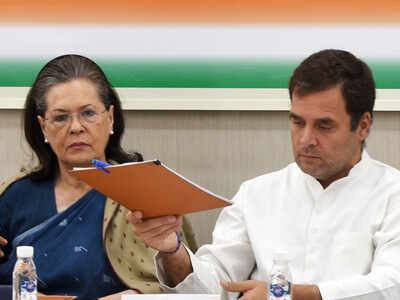
NEW DELHI: When Kabil Sibal tweeted on Sunday, “Worried for our party. Will we wake up only after the horses have bolted from our stables?,” the larger meaning wasn’t lost on anybody who follows national politics. The senior Congress politician wasn’t merely referring to the fresh face-off between Rajasthan CM Ashok Gehlot and deputy CM Sachin Pilot but ruminating on the general state of affairs in the Grand Old Party.
What ails Congress? Is it a crisis of leadership, or ideology? Social scientist Yogendra Yadav says that “the leadership crisis at the top reflects a crisis of political judgment which in turn reflects a deeper crisis of existence, of defining what this party stands for at the present juncture in history.”
In 2019 Lok Sabha polls, Congress won only 52 seats and received less than 20% share of votes. In this backdrop, political scientist James Manor elucidates on Congress’ chances of revival in a forthcoming paper for the journal, Indian Politics and Policy. He divides the states into three distinct categories: (a) States where a Congress revival is probably impossible (total: 260 MPs): (Andhra Pradesh, Uttar Pradesh, Bihar, Tamil Nadu, West Bengal, Odisha and Jharkhand). (b) States where a revival and significant gains in a national election are not unthinkable but will be difficult (total: 110 MPs): Delhi, Telangana, Maharashtra, Haryana, Gujarat. (c) States where a revival or continued success are realistic possibilities (total: 140 MPs): Karnataka, Kerala, Madhya Pradesh, Rajasthan, Chhattisgarh, Punjab and Assam.
In other words, he sums up that the revival, or continued success of Congress is “a realistic” possibility only in states sending 26% of MPs to New Delhi. Nonetheless, he believes that a conditional regeneration is possible. Manor, a professor in University of London, writes, “Congress might achieve something of a revival if it gives its state-level leaders and party units greater autonomy and flexibility to adapt to distinctive conditions in India’s diverse regions; if it strengthens its organisation, partly by mounting agitations (in concert with popular protest movements) against unpopular BJP policies; and if it can competently offer voters an appealing strategy for governing and development.”
But Manor, a tracker of Indian politics for several decades, proposes a bunch of solutions, notably re-democratisation, re-federalisation, organization building. But he also points out the risks in making such an effort. One of them is the serious potential for infighting within Congress; hence the need to proceed with caution. “Second, the Congress must recognise that it is beyond resuscitation in nearly half of India – so that it steps aside for more promising regional parties in many states, and agrees to alliances with them. If it fails to do that, it could damage the prospects of the broader opposition.”
Political scientist Imtiaz Ahmed says that the roots of the current Rajasthan crisis -- and similar crises in other states -- go back to the Indira Gandhi years. “Historically, the Congress was a highly decentralised party which allowed new regional leadership to emerge and get integrated into the party structure,” he says.
It’s due to the compulsions created by the first split within Congress in 1969 during the Indira Gandhi era that a process of centralisation set in and the party's capacity to induct new regional leadership was lost. “Unlike the Nehru era, the party functions today as a centralised apparatus with the so-called Old Guards holding the trump in their hands and restricting the emerging crop of leaders at bay. In both MP and Rajasthan, the political crisis was precipitated by younger leaders who felt their mobility blocked,” Ahmad says.
He further adds, “This could have been averted to a great extent by a seasoned High Command whose words would have been respected. Certainly we have a High Command but its capacity to curb dissent and deviance has been greatly attenuated.”
Rasheed Kidwai, visiting fellow, Observer Research Foundation, says that the Sonia Gandhi family has been in-charge of the party since 1998. “Now Rahul and Priyanka also have their own world views as well as favourites. This makes decision-making tardy,” he says.
Kidwai says that Congress was known as a pragmatic party which was always in tune with the national sentiments. “Now the party seems to have lost its ability to feel the popular pulse,” he says.
What ails Congress? Is it a crisis of leadership, or ideology? Social scientist Yogendra Yadav says that “the leadership crisis at the top reflects a crisis of political judgment which in turn reflects a deeper crisis of existence, of defining what this party stands for at the present juncture in history.”
In 2019 Lok Sabha polls, Congress won only 52 seats and received less than 20% share of votes. In this backdrop, political scientist James Manor elucidates on Congress’ chances of revival in a forthcoming paper for the journal, Indian Politics and Policy. He divides the states into three distinct categories: (a) States where a Congress revival is probably impossible (total: 260 MPs): (Andhra Pradesh, Uttar Pradesh, Bihar, Tamil Nadu, West Bengal, Odisha and Jharkhand). (b) States where a revival and significant gains in a national election are not unthinkable but will be difficult (total: 110 MPs): Delhi, Telangana, Maharashtra, Haryana, Gujarat. (c) States where a revival or continued success are realistic possibilities (total: 140 MPs): Karnataka, Kerala, Madhya Pradesh, Rajasthan, Chhattisgarh, Punjab and Assam.
In other words, he sums up that the revival, or continued success of Congress is “a realistic” possibility only in states sending 26% of MPs to New Delhi. Nonetheless, he believes that a conditional regeneration is possible. Manor, a professor in University of London, writes, “Congress might achieve something of a revival if it gives its state-level leaders and party units greater autonomy and flexibility to adapt to distinctive conditions in India’s diverse regions; if it strengthens its organisation, partly by mounting agitations (in concert with popular protest movements) against unpopular BJP policies; and if it can competently offer voters an appealing strategy for governing and development.”
But Manor, a tracker of Indian politics for several decades, proposes a bunch of solutions, notably re-democratisation, re-federalisation, organization building. But he also points out the risks in making such an effort. One of them is the serious potential for infighting within Congress; hence the need to proceed with caution. “Second, the Congress must recognise that it is beyond resuscitation in nearly half of India – so that it steps aside for more promising regional parties in many states, and agrees to alliances with them. If it fails to do that, it could damage the prospects of the broader opposition.”
Political scientist Imtiaz Ahmed says that the roots of the current Rajasthan crisis -- and similar crises in other states -- go back to the Indira Gandhi years. “Historically, the Congress was a highly decentralised party which allowed new regional leadership to emerge and get integrated into the party structure,” he says.
It’s due to the compulsions created by the first split within Congress in 1969 during the Indira Gandhi era that a process of centralisation set in and the party's capacity to induct new regional leadership was lost. “Unlike the Nehru era, the party functions today as a centralised apparatus with the so-called Old Guards holding the trump in their hands and restricting the emerging crop of leaders at bay. In both MP and Rajasthan, the political crisis was precipitated by younger leaders who felt their mobility blocked,” Ahmad says.
He further adds, “This could have been averted to a great extent by a seasoned High Command whose words would have been respected. Certainly we have a High Command but its capacity to curb dissent and deviance has been greatly attenuated.”
Rasheed Kidwai, visiting fellow, Observer Research Foundation, says that the Sonia Gandhi family has been in-charge of the party since 1998. “Now Rahul and Priyanka also have their own world views as well as favourites. This makes decision-making tardy,” he says.
Kidwai says that Congress was known as a pragmatic party which was always in tune with the national sentiments. “Now the party seems to have lost its ability to feel the popular pulse,” he says.
Download
The Times of India News App for Latest India News

Coronavirus outbreak
Trending Topics
LATEST VIDEOS
India
 Coronavirus crisis may get 'worse and worse and worse', warns WHO
Coronavirus crisis may get 'worse and worse and worse', warns WHO  Public verdict is being purchased, auctioned: Digvijaya Singh on Rajasthan political crisis
Public verdict is being purchased, auctioned: Digvijaya Singh on Rajasthan political crisis  Sharad Pawar should join NDA if he wants Centre to give more funds to Maharashtra: Ramdas Athawale
Sharad Pawar should join NDA if he wants Centre to give more funds to Maharashtra: Ramdas Athawale  Aim is to increase GDP, agriculture growth rate: Nitin Gadkari
Aim is to increase GDP, agriculture growth rate: Nitin Gadkari  Retail inflation stood at 6.09%; food inflation at 7.87%
Retail inflation stood at 6.09%; food inflation at 7.87%  Anantnag encounter: 2 terrorists neutralised by security forces
Anantnag encounter: 2 terrorists neutralised by security forces
More from TOI
Navbharat Times
Featured Today in Travel
Quick Links
Coronavirus in MumbaiCoronavirus in KolkataCoronavirus in HyderabadCoronavirus in DelhiCoronavirus in BangaloreCoronavirus symptomsCoronavirus in IndiaWhat is CoronavirusCoronavirus NewsSolar EclipseNPRWhat is NRCCAB BillCAB and NRCRTI BillPodcast newsLok SabhaShiv SenaYSRCPCongressBJP newsUIDAIIndian ArmyISRO newsSupreme Court
Get the app



